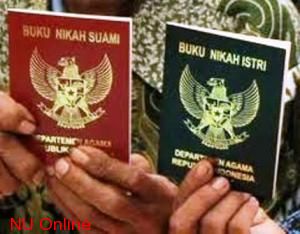Marriage contract law via video call due to pandemic
NU Online · Sabtu, 7 Agustus 2021 | 10:34 WIB
Assalamu'alaikum wr. wb.
Dear Editor of NU Online, please let me know of your decision on the following cases. I am a Muslim woman living in Indonesia who is going to marry a future husband who lives in Europe. Actually, we have set a wedding date this year, but because of the very high cases of the Corona outbreak and also his busy schedule as a doctor, it is impossible to leave his job for a long time. Finally, our wedding was postponed, and we didn't know how long. We still continue to see the development of the situation in each of our countries.
However, yesterday I saw a wedding conducted via video call. Frankly, I don't really understand marriages that are done via video calls. Explain please. Could it also be applied to my case? Is such a marriage legal under the laws of religion and the state? Thank you. Wassalamu'alaikum wr. wb. (Fit/Yogyakarta).
Answer
Dear questioner and reader, may Allah give His mercy to all of us. In Islam, the validity of the marriage contract depends on the fulfillment of the pillars and conditions. If it fulfills then it is valid; and if it does not meet the conditions it is not valid. The five pillars that must be fulfilled are the existence of a prospective husband, prospective wife, shighat ijab qabul, wife's guardian, and two (2) witnesses, each of which must fulfill the conditions to achieve the validity of the marriage contract. (Ibrahim al-Baijuri, Hâsyiyyatus Shaykh Ibrâhîm al-Baijuri 'alâ Syarhil 'Allâmah Ibnil Qâsim al-Ghazi, [Beirut, Dârul Kutubil 'Ilmiyyah: 1420 H/1999 AD], second printing, juz II, page 170).
Referring to the decision of Bahtsul Masail PWNU East Java at the Education and Training Office of the Ministry of Religious Affairs Surabaya on 09-01 Jumadi Tsani 1430 H/02-03 June 2009 AD which formulated that online marriage contracts are not valid, then the marriage contract via video call is also invalid . (East Java PWNU LBM Team, NU Responding to People's Problems; Decisions of Bahtsul Masail PWNU East Java, [Surabaya: East Java NU LBM PW, 2015], volume 1, pages 898-904). The invalidity of the marriage contract via video call is due to two factors. The first factor, the pillars of the so-called sighat ijab qabul marriage which is conducted by video call is classified as shigat kinayah (unclear). Even though the marriage contract is required to use a shigat that is sharih or clear. In this regard, the contemporary Shafi'i fiqh expert al-Habib Zain bin Smith (born 1357 H/1936 AD) asserts:
اَلتِّلْفُوْنُ ايَةٌ الْعُقُوْدِ الْبَيْعِ السَّلَمِ الْإِجارَةِ، ذَلِكَ اسِطَةِ التِّلْفُوْنِ،أَمَّا النِّكَاحُ لَا التِّلْفُوْنِ لِأَنَّهُ لَفْظٌ صَرِيْحٌ، التِّلْفُوْنُ كِنَايَة
It means, “Phone calls become shighat kinayah in several contracts, such as sale and purchase contracts, salam contracts and rental contracts; then the contracts are valid through telephone intermediaries. As for the marriage contract, it is not valid, because the marriage contract is required to have a clear pronunciation, while the telephone is considered kinayah (containing two meanings/unclear pronunciation).” (Zain bin Ibrahim bin Smith, al-Fawaid al-Mukhtarah li Salik Tariq al-Akhirah, [ttp.: Ma'had Dar al-Lughah wa ad-Da'wah, 1429 H/2008 AD], ed: Ali bin Hasan Baharun, first printing page 246).
The second factor, the absence of an offline gathering that allows the two witnesses to see the two (2) contract actors, namely the husband and guardian of the prospective wife who married her, and hearing the shigat qabul consent from them directly. As understood, the marriage contract is required to be witnessed directly by two witnesses.
Although in contemporary fiqh, mu'amalah contracts through modern communication tools such as telegrams, facsimiles, or the internet could be considered valid, this does not apply to marriage contracts. Because, in the marriage contract, it is required to have direct testimony from two (2) witnesses. Therefore, the validity of conducting mu'amalah transactions with these modern tools does not include marriage contracts. This is as formulated in the Decree of the Majma' al-Fiqh al-Islami Council number 6/3/45 concerning the Implementation of Contracts with Intermediaries of Modern Communication Tools as stipulated in the VI Congress in Saudi Arabia on 17-23 Sha'ban 1430 H/14- March 20, 1990 AD:
الْقَوَاعِدَ السَّابِقَةَ لَا لُ النِّكَاحَ لِاشْتِرَاطِ الْإِشْهَادِ
It means, "Indeed the rules that have been explained (the validity of the mu'amalah contract with the intermediary of modern tools) do not include the marriage contract, because in it a witness is required." (Decision of the Majma' al-Fiqh al-Islami Council number 6/3/45 concerning the Implementation of Contracts with Intermediaries of Modern Communication Tools in Wahbah az-Zuhaili's work al-Fiqh al-Islami wa Adillatuh, [Damascus: Dar al-Fikr, tth] , juz VII, page 157).
The legal formulation that stipulates the invalidity of the marriage contract via video call is a very careful one in line with the principles of fiqh: 'Al-Abdha' yuhtathu laha fauqa ghairiha” (The issue of the halal status of women for other men must be treated more carefully than those of other matters.” (Abu Bakr ibn as-Sayyid Muhammad Syattha ad-Dimyathi, Hasyiyah I'anah at-Thalibin 'ala Hall Alfazh Fath al-Mu'in, [Bairut: Dar al-Fikr, tth.], juz III, page 86).
However, in fiqh there is a solution for holding marriages remotely, namely through representatives or wakalah contracts either through letters, messengers, telephones, internet networks, video calls or the like. (Al-Baijuri, Hâsyiyyatus Shaykh Ibrahim al-Baijuri, juz I, page 739).
Then the prospective husband who is abroad can make a power of attorney or appoint a representative of the person he trusts to represent him to receive the marriage contract from the guardian of the prospective wife. This is because in wakalah there is no requirement for a unitary assembly as the rules are very strict in the marriage contract. Details on how the prospective husband appoints his representative and the sighat of the representative of the prospective husband in accepting the marriage contract could be read in the article entitled: Law of Prospective Husband Representing the Marriage Contract because of Positive Covid-19.
In short, the marriage contract via video call is not legal. However, there is a solution, namely the prospective husband appoints a representative to accept the marriage contract.
This is in accordance with the Islamic jurisprudence. In terms of the state law and other administrative matters, consultations could be made with the nearest KUA (Religious Affairs Office).
Hopefully this short answer could be understood well. We are always open to receiving suggestions and criticisms from readers. Wallâhul muwaffiq ilâ aqwamith tariq. Wassalamu 'alaikum wr. wb.
Ahmad Muntaha AM, Islamic Editor of NU Online and Founder of Aswaja Muda.
Terpopuler
1
Khutbah Jumat: Refleksi Kemerdekaan, Perbaikan Spiritual dan Sosial Menuju Indonesia Emas 2045
2
Prabowo Klaim Selamatkan Rp300 Triliun APBN, Peringatkan Risiko Indonesia Jadi Negara Gagal
3
Khutbah Jumat Bahasa Sunda: Ngeusian Kamerdekaan ku Syukur jeung Nulad Sumanget Pahlawan
4
Taj Yasin Pimpin Upacara di Pati Gantikan Bupati Sudewo yang Sakit, Singgung Hak Angket DPRD
5
Gus Yahya Cerita Pengkritik Tajam, tapi Dukung Gus Dur Jadi Ketum PBNU Lagi
6
Ketua PBNU: Bayar Pajak Bernilai Ibadah, Tapi Korupsi Bikin Rakyat Sakit Hati
Terkini
Lihat Semua




















